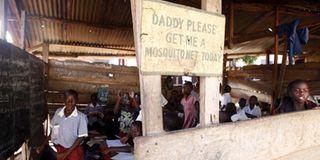Half of UPE pupils cannot read - government

Pupils of Katosi Church of Uganda Primary School in a dilapidated classroom recently. MPs have backed the Ministry of Education for closing private schools that operated below set standards. PHOTO BY RACHEL MABALA
What you need to know:
Concern. Prime Minister’s report shows 34 per cent of teachers don’t know English while 40 per cent are incompetent in primary mathematics.
Kampala. A new government self-assessment report has revealed that half of pupils in the Universal Primary Education (UPE) schools are illiterate and cannot answer simple questions in mathematics.
The report details failures in service delivery and the reasons why the quality of education in government schools has degenerated to absurdity.
The ministries of Education and Health are presented as the worst performers in government institutions.
The report done by the Office of the Prime Minister shows that proficiency (knowledge) for Primary Six pupils, especially those in UPE schools, have not improved for the last 10 years and the situation is getting worse.
“Results for P.3 and P.6 literacy and numeracy are poor with only 50 per cent of our kids in P.6 achieving the basic proficiency levels,” Prime Minister Ruhakana Rugunda told the delegates at the ongoing Cabinet retreat in Kyankwanzi on Tuesday while presenting the report findings.
He said UPE schools have been ruined by rampant teacher absenteeism because of lack of or partial supervision of the schools across the country.
The report says classroom teachers absent themselves at least two days a week and head teachers three days a week.
Given that there are five study days in a week, this means that head teachers are absent from school for half of every week.
The Prime Minister’s Office also discovered that the competence of teachers in UPE is also poor.
For instance, the report states, that proficiency of teachers in English language was found to be at 66.4 per cent while numeracy is at 60.4 per cent for teachers in service.
The Prime Minister’s Office also said quality of education is insufficient due to high teacher-pupil ratio of 1:54 compared to the recommended ceiling of 1:40.
The government report matches the findings of the 2015 East African survey which indicated that more Ugandan pupils were unable to read and count compared to their Kenyan and Tanzanian counterparts.
The third Uwezo East Africa report on numeracy and literacy titled: “Are Our Children Learning?” indicated that little has changed in the learning outcomes since the regional assessment in 2010.
Healthcare
The Prime Minister’s report also showed a similar rot in the healthcare sector. Quoting the Health Monitoring Unit (HMU) report of 2016 on health centre IVs, the Prime Minister’s report says only 33 per cent of the facilities had functional theatres that could handle major cases while 41.7 per cent of those that had theatres were not operational at all.
“Of the non-functional theatres, health centre IVs, 50 per cent of them had no aesthetic officers as the major cause of lack of service,” Dr Rugunda, himself a former minister of Heath, told the delegates at the Kyankwanzi retreat.
At Mwizi Health Centre IV in Mbarara District, the HMU team found the general ward overflowing with unused equipment, leaving no space for patient admissions.
For example, 15 more beds were supplied in February this year but there was no space for them in the ward.
At Masindi hospital, wards were not being utilised and instead, were heaped with new beds which were poorly stored on top of each other.
In spite of having unutilised beds, two beds were supplied in February 2016 but there was no space where to place them.
“How is procurement planning done? What’s happening to management and supervision?” Dr Rugunda asked the ministers at the retreat without getting any answers.
He also noted “sluggish” implementation of externally funded projects where taxpayers have lost nearly Shs90 billion because of government failure to utilise the funds.
This money is paid to multinational financing institutions as commitment fees on unutilised borrowed funds.
The commitment fees, according to Dr Rugunda and Auditor General John Muwanga, are “nugatory expenditures” and “negatively affect the country’s debt sustainability and service delivery.”
Corruption cited
Mr Mathias Mpuuga (Masaka Municipality MP) described the rot as “the shame of corruption in the face of government failures”.
“If we had a serious government, we wouldn’t be having hospitals without doctors, without drugs and with non-operational theatres, not even schools without classrooms and teachers. We have these problems because those in authority don’t care. Why should they care about hospitals and schools which they don’t use?” Mr Mpuuga said.
Commenting on the government failures cited by the Prime Minister, the Information and ICT minister Frank Tumwebaze, said poor inspection was raised as the key weak point and thus calls for scaling up inspection efforts to address service delivery failures.
“Blame game is not what Ugandans want. Ugandans want to hear and see new approaches day-by-day to improve service delivery. That’s why as NRM and government we are retreating to discuss alternative approaches for better quality results,” Mr Tumwebaze said.
“When a problem is correctly identified, it’s partly resolved. These problems in health, education and in other sectors are known to government and they will be decisively handled. This is what we are doing in a dynamic way. So blame games without alternatives are meaningless,” he added.




